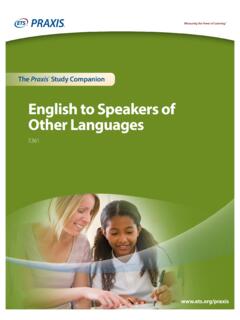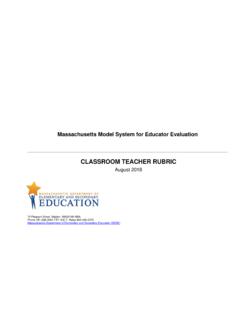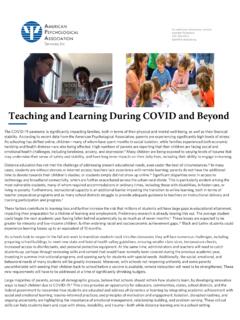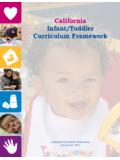Transcription of Multicultural Education: Teachers’ Perceptions and …
1 Journal of education and Practice ISSN 2222-1735 (Paper) ISSN 2222-288X (Online) , , 2016 139 Multicultural education : Teachers Perceptions and Preparation Halah Ahmed Alismail Department Curriculum and Instruction, School of education , University of Minnesota Abstract This paper focuses on theory and practice in Multicultural education as it pertains to the preparation of preservice teachers. The literature reviews the history and definition of multiculturalism and investigates multiple theoretical frameworks around the ongoing debate and issues of Multicultural education .
2 Teachers Perceptions of Multicultural education and various approaches to Multicultural pedagogy and curriculum are explored. The finding indicates that thorough and balanced courses preparing preservice teachers to teach culturally diverse students are essential to supporting teachers awareness, knowledge, and skill in providing equal education for all students. Keywords: conservative, liberal, and critical multiculturalism, teachers' Perceptions and preparation. 1. Introduction The common belief that America is a land of opportunity is why immigrants often choose the to study and seek jobs. This phenomenon has influenced the demographics of the United States, which has seen a rapid growth in the foreign-born population, especially those from Asia and Latin America.
3 Thus, the ethnic and racial makeup of schools, workplaces and neighborhoods has increased. According to the Census Bureau's 2010 and 2013 American Community Surveys, the estimated number of foreigners in the US increased from million to million between 1970 and 1990. The number of immigrants grew in 2013 to million, a quadrupling since 1970. The children of these newcomers have changed not only the makeup of the public school population, but classroom dynamics as well. For Saint Paul Public Schools (2014), the district reported an enrollment of 19, 383 elementary level pupils for the 2014- 2015 school year. These diverse students backgrounds consisted of: American Indian, Asian, Hispanic, Black, and White.
4 Seventy-two percent of these students came from low-income families. Moreover, 41% were English language learners. Multicultural education was created to provide educators with a platform for working with such diverse school populations and achieving justice within societies marked by inequalities based on language, gender, socioeconomic status, or religion (Banks, 2004). The emergence of multiple and overlapping identities involving ethnicity, gender, religion, and transnationalism has further complicated the concept of diversity and Multicultural education , and effected how teachers address the needs of children from a widening cultural spectrum (Banks, 2004; Kymlicka, 1995).
5 Because of the cultural and racial diversity of the US student population, educators must realize the differences among their students and integrate diversity education into the entire curriculum to implement Multicultural education successfully. One of the other challenges in Multicultural education is that of providing a fair education for students with the purpose of achieving social justice (Gordon, 1999). A fair education takes into account the perspectives of many groups. By establishing a fair and inclusive curriculum, the mainstream-centric perspectives that are only viewed as significant by the mainstream society can be avoided (Banks, 1988, p.)
6 18). However, ideological and/or political resistance, and high-stakes testing and teacher accountability make any curriculum changes towards multiculturalism difficult since educators must know the cultural characteristics of their students in diverse cultures before teaching minority students. Teachers must also have adequate skills to enable them to integrate the students' different cultures into classroom experiences. In this regard, Sue, Arredondo, and McDavis, (1992) argue that Multicultural competence requires the development of three levels of understanding: awareness, knowledge, and skills. However, these competencies are hard to acquire (Garcia & Pugh, 1992).
7 Therefore, preservice training is a very important factor in helping educators recognize the effects of cultural and racial diversity on students. It also prepares them to use this diversity as a classroom resource influencing their teaching practices. By effectively preparing preservice teachers to implement multiculturalism, these new teachers become multiculturalism s advocates, more prepared to achieve equity and social justice in their classrooms. The main purpose of this research is to investigate preservice teachers Perceptions of Multicultural education and the effectiveness of professional training programs in Multicultural education .
8 This research is significant because it illustrates teachers Perceptions of Multicultural education and the role of professional preparation in teaching culturally diverse students. Through adequate preparation, teachers perspectives towards multiculturalism can change, and through the acceptance of their students diversity, they may also feel confident and encouraged to incorporate more Multicultural experiences into their classrooms. Researchers emphasize that Journal of education and Practice ISSN 2222-1735 (Paper) ISSN 2222-288X (Online) , , 2016 140 the professional preparation process can increase teachers awareness of the impact of cultural differences, and to bring children s different cultures into the classroom, influencing their teaching strategies (Garmon, 2004; Gay, 2005).
9 Multicultural perspectives should prepare teachers to critically reflect on the power and privileges of dominant culture, their own place within these systems, and to deconstruct them to create social equality through teaching practice. Jenks et al. (2001) identified three theoretical frameworks of Multicultural education in teacher education : conservative, liberal, and critical multiculturalism. In the conservative multiculturalism framework, marginalized groups are expected to assimilate into the mainstream culture (Gorski, 2006); their voices and perspectives are neither accepted nor appreciated (Kanpol, 1994). Conservative multiculturalists see themselves as committed to equality, but that equality comes from assimilation to the mainstream culture and its attending values, mores, and norms (p.)
10 90). This theory of multiculturalism assumes that equality is possible for all and can be evenly apportioned (McLaren, 1999). Similarly, Ladson-Billings (1995) argue that the current Multicultural education practice seems more appropriately rooted in the intergroup education movement of the 1950s, which was designed to help African Americans and other unmeltable ethnics become a part of America s melting pot (p. 741). Platt (2002) argues that conservative theories of multiculturalism see race as ahistorical and universal without considering the economic or class aspects of diversity. Critical multiculturalists directly challenge conservative multiculturalism.













